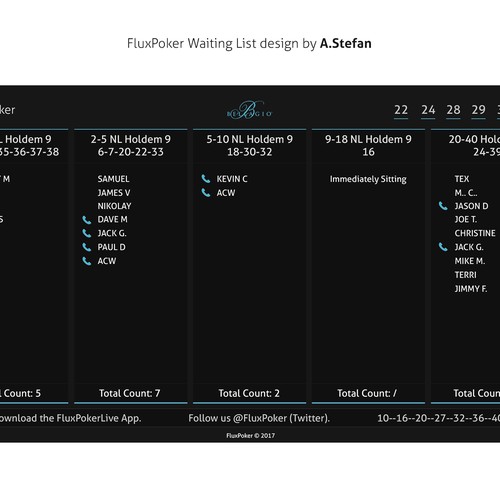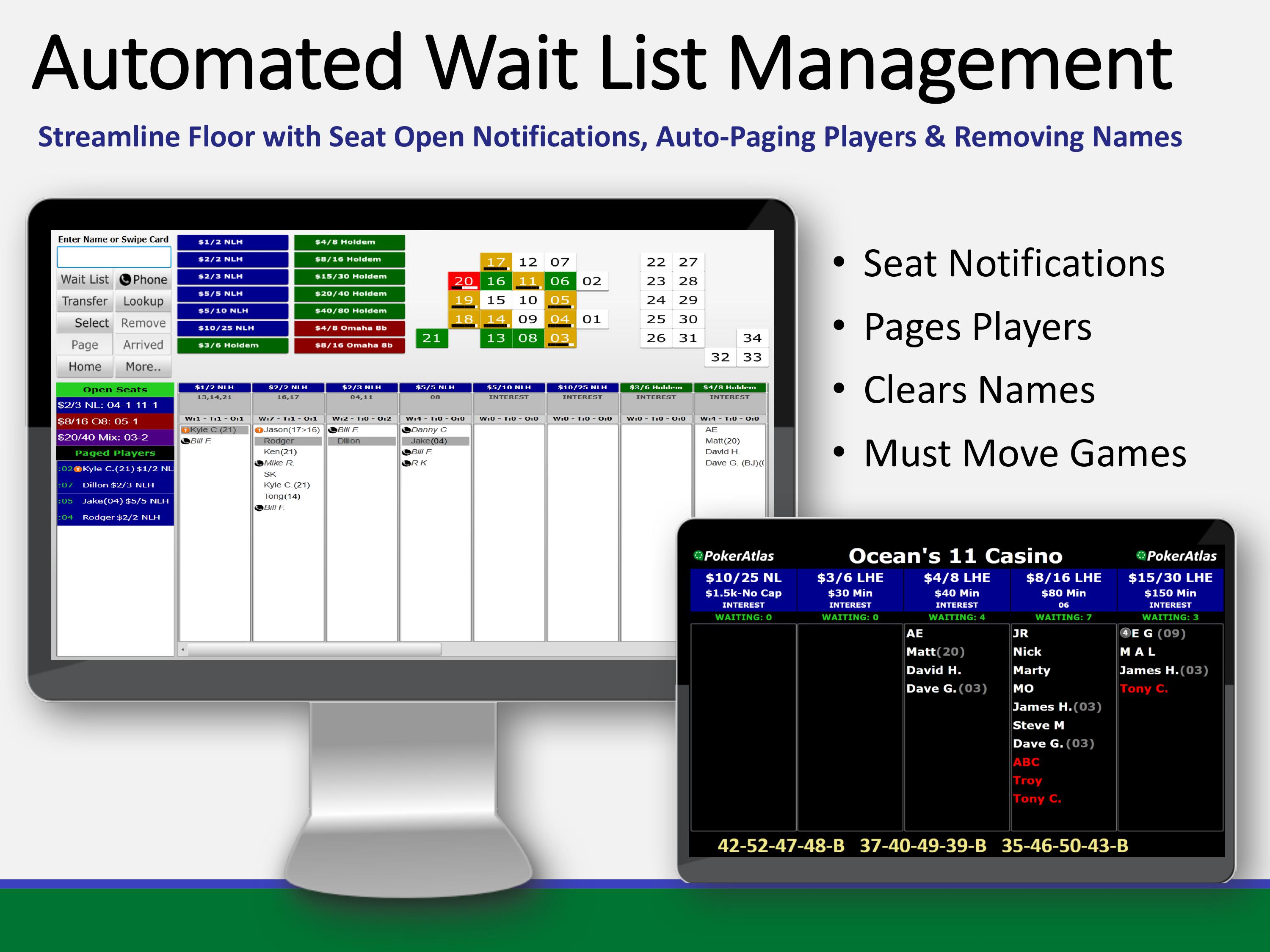Poker Room Waiting List Software
Two weeks ago, pokerfuse exclusively reported that the Full Tilt client would be sunset. Last Thursday, the desktop and mobile apps were taken offline across markets globally.
Poker Room Waiting List Software However, this is no longer the case, and you can enjoy every casino game type at any top site through your desktop or mobile web browser Poker Room Waiting List Software of choice (i.e. Chrome, Edge, Safari, Firefox, Opera, etc.). The app works only for cardrooms that employ Bravo's software, so many smaller poker rooms aren't available. And you can't use Bravo's app to get on the wait list - you have to call in - but the.
This marks the end to almost all the remaining assets of Full Tilt poker: From its cartoonish avatars and classic table themes to the iconic logo the ear-worm sound effects, what was once one of the most exciting online poker operators in the industry is all but gone.
Putting a single date on its ultimate demise is open to debate. This latest development is just one in a string made by owners PokerStars in winding down the brand. It has been almost five years since the iconic software was sunset. Since then, Full Tilt has been operating as a skin on PokerStars’ software, sharing the same player pool and offering only cosmetic differences.
Even today, the brand has not completely disappeared. The Full Tilt poker website and web product—PokerStars’ new browser-based poker client—remains online for now. The download link on the website has been replaced with that of PokerStars, but players can continue to use the instant play option by clicking on “Play” on the homepage.
However, this web product is entirely different from the iconic Full Tilt software. There are no cartoonish avatars, no Vegas skyline table theme nor any of its special sound effects. Instead, a simple browser-based poker client, akin to the operator’s old generation mobile app, but with limited game options and features, is all that remains.
This instant play option notwithstanding, the shutting of Full Tilt’s desktop and mobile apps mark the end of an era. Pokerfuse takes a look at the ups and downs of Full Tilt Poker over its 17-year history.
Rode High on Moneymaker Boom
Full Tilt was launched in 2004 under the ownership of Tiltware LLC. It involved some of the big names in the industry at the time, including former WSOP Main Event winner Chris Ferguson.
Riding high on the first online poker boom caused by the Moneymaker effect, the site quickly became one of the largest online poker rooms in the world. It had the reputation of professional poker players, was the primary sponsor of a number of poker TV programs and boasted exceptional software out of the gate.
It also became synonymous with high-stakes poker featuring nosebleed legends like Tom Dwan, Phil Ivey, Viktor “Isildur1” Blom and Phil Galfond. It was home of rail heaven. Post-UIGEA, it became the number one competitor of PokerStars.
Master of Innovations and New Features
Full Tilt Poker in its prime revolutionized the online poker industry by bringing several unique features to its poker platform.

Most famously, it invented Rush Poker in 2010, a fast-fold poker variant that allows players to “quick fold” and jump instantly to the next hand.
It was an instant success, and other operators took note. PokerStars joined the instant-action bandwagon with its own fast-fold variant called Zoom Poker.
Data provided by GameIntel
Today, the format has proved to be so popular that almost every online poker room spreads their own version.
Besides the revolutionary Rush, Full Tilt also introduced dozens of new games and features.
It launched Matrix tournaments, a sit & go style tournament played with a special scoring system, in 2008; Cashout tournaments allowing players to redeem all or a portion of tournament chips for immediate cash; Flipout tournaments allowed players to flip their way straight into the money. (this format has been re-instated by GGPoker as Flip & Go).
Full Tilt is also the inventor of multi-entry tournaments, in which players can effectively multi-table the same scheduled tournament, playing multiple chips stack at separate tables. Furthermore, it also introduced Double and Triple Chance MTTs, today known as re-entries.
It is also one of the first online poker rooms to roll-out Run It Twice, automated deal-making at final tables, on-demand sit and go’s, 4-handed Adrenaline Rush, in which players’ options were limited to raising or folding, tournament waiting lists, and more.
Action formats such as Irish Poker and 6 Card Omaha, plus 5-Card Stud and 25-Game Mixed Game variants, are also all creations of Full Tilt Poker.
List of Full Tilt Poker Online Poker Inventions
- Rush Poker
- Multi-Entry Tournaments
- Double and Triple Chance MTTs (Re-Entries)
- Matrix Tournaments
- Cashout Tournaments
- Flipout Tournaments
- Run It Twice
- Irish Poker, 6 Card PLO, 5-Card Stud
- 7-Game, 10-Game and 25-Game Mixed Game Variants
- Automated Dealing
- Poker Hybrid Jackpot The Deal
- On-Demand SNGs
- Tournament Waiting List
- 4-handed Adrenaline Rush
Controversies, Lawsuits And Black Friday

Full Tilt was certainly not immune to controversies and lawsuits. Its company and the founders faced multiple lawsuits alleging unfair and unlawful business practices. There were also accusations of poor financial decisions against the owners, leading to one of its board members quitting.

And then Black Friday happened. In April 2011, the US Department of Justice seized money and the domains of Full Tilt, PokerStars, and Absolute Poker. The US Department of Justice alleged that these online poker rooms laundered money, violated US federal gaming laws, and committed bank fraud by misleading banks about the true nature of their business.
Poker Room Waiting List Software
In June later that year, the site was forced to close and its license was suspended.

What the Department of Justice discovered on the books of Full Tilt was massive fraud against its own players. The operator did not have player funds in deposit, like it said it did. A civil complaint against executives alleged that player funds were stolen, and players were deceived, in what amounted to “global Ponzi scheme,” it was claimed.
PokerStars came to the rescue. Having already repaid its own US players in full within weeks of its shutdown, in April 2012, it reached a settlement with the US DOJ to purchase its long-time rival and its assets. As part of the settlement, it agreed to repay all the money owed to Full Tilt players.
Second Round of Full Tilt

Full Tilt relaunched in November 2012 to much fanfare, but early euphoria soon died down. It did continue to innovate with new games and formats, hosted its flagship FTOPS series and expanded into gaming beyond poker, but it struggled to maintain traffic like it did before Black Friday.
A few years later, the operator adopted a dramatic new strategy to make the poker room more attractive to “recreational” players by removing table selection, heads-up games, nosebleed games and mixed games.
Poker Room Waiting List Software Download Sites
It then revamped its reward program to please casual players, a pivotal moment for the industry in its approach to player loyalty.
Poker Room Waiting List Software Windows 10
However, none of these moves worked. The site was migrated to the PokerStars platform in 2016. A Full Tilt representative told PRO site that the original software would not be put up for sale.
For the next five years, it quietly continued to operate as a skin of PokerStars, but with fewer game options. However, keeping Full Tilt in sync with constant upgrades to PokerStars’ client has forced the operator to shelve Full Tilt skin.
Its first shutdown process began in October last year, forcing the dot-EU players to switch to the PokerStars platform. On February 25, the Full Tilt skin was been closed entirely.
Poker Room Waiting List Software List
Today, it lives on in the web client, though how long that will last remains to be seen.